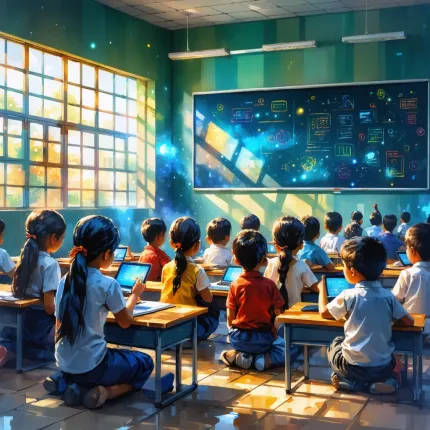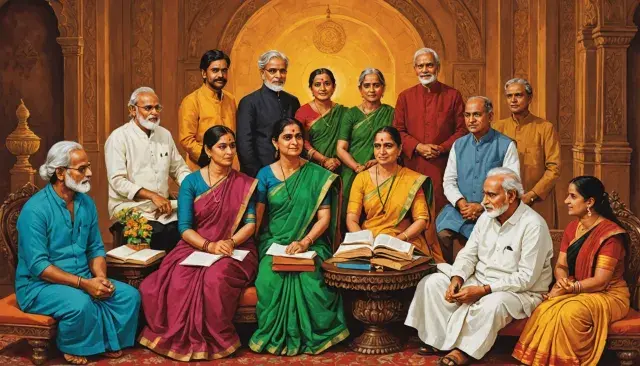Are Our Students Truly Ready for the Challenges Ahead?
Imagine the day of the NEET Exam 2025 or the JEE Main 2025. Thousands of students across India sit nervously with dreams larger than life, hoping their years of study will finally pay off. Yet, beyond the anxiety and the exam halls, there lies a deeper question: Are these exams—and the overall education system—really preparing students for the future? Or are they just checkpoints in a race that often feels more about rote memorization than meaningful learning?
For years, Indian students have grappled with a system that emphasizes scores over skills, cramming over creativity. The CBSE Board Exam 2025 is no exception; while it remains a pivotal milestone, many students feel it doesn’t reflect the full spectrum of their abilities or potential. Parents, teachers, and policymakers alike have voiced concerns about whether the current framework truly equips students to thrive in an ever-changing world.
Why Does This Matter More Now Than Ever?
In a world racing towards automation, digital innovation, and global interconnectedness, education must evolve—not just in content but in approach. The pressure cooker environment surrounding exams like NEET and JEE Main often sidelines holistic development, critical thinking, and creativity. This creates a ripple effect: students emerge high scorers but sometimes underprepared for real-world challenges.
Consider this startling reality: Despite India producing millions of graduates annually, many employers report a significant skill gap. Students with impressive marks on their CBSE Board Exam 2025 certificates sometimes lack practical problem-solving abilities or adaptability. It’s a disconnect that has been growing for decades and is now impossible to ignore.
Moreover, the intense focus on a few high-stakes exams has led to widespread stress and mental health issues among students. The stakes feel enormous—one exam can seem like a life-defining moment. This has pushed many to the brink, raising urgent calls for a system that nurtures well-being alongside academic excellence.
What is Changing? A Glimpse into the Educational Reforms Transforming India for 2025
Thankfully, the winds of change are stirring. Education authorities and experts are reimagining how learning should unfold in the 21st century. The reforms gearing up for implementation around the NEET Exam 2025, JEE Main 2025, and the CBSE Board Exam 2025 are designed to break free from outdated norms and foster a more inclusive, skill-based, and student-friendly environment.
These reforms aim to reduce rote learning and incorporate more conceptual understanding, critical thinking, and application-based questions. They are also pushing towards integrating digital tools, flexible curricula, and continuous assessment methods to better capture a student's progress and potential.
In essence, the goal is to transform exams from mere gateways to certificates into meaningful milestones that genuinely reflect a student’s readiness for higher education and life beyond the classroom.
What’s Next?
In this article, we will take a deep dive into these sweeping educational reforms. You’ll learn how changes around the NEET Exam 2025 and JEE Main 2025 are reshaping entrance examinations, how the CBSE Board Exam 2025 is evolving to balance knowledge with skills, and what this means for students, parents, and educators alike.
Whether you’re a student gearing up for these important exams, a parent navigating the complexities of the Indian education system, or an educator eager to understand the future landscape of teaching and assessment, this comprehensive guide will offer valuable insights and actionable information.
So buckle up—this journey into India’s educational transformation promises to be as enlightening as it is essential. Because when education changes, the future of a billion dreams changes too.

Educational Reforms for Students in India: Enhancing Learning for 2025
What are the key educational reforms planned for students in India by 2025?
India’s education system is undergoing significant reforms aimed at holistic development, skill enhancement, and inclusivity. The National Education Policy (NEP) 2020 is the cornerstone that drives these changes, focusing on making education student-centric and competency-based. By 2025, reforms emphasize reducing rote learning, promoting critical thinking, integrating technology, and updating curricula across all levels — from school to higher education.
Some major reform highlights include:
- Introduction of multidisciplinary education with flexibility in course choices.
- Greater emphasis on experiential and inquiry-based learning.
- Use of Artificial Intelligence and digital tools to personalize learning.
- Revising assessment methods to evaluate conceptual understanding rather than memorization.
- Focus on vocational education and skill development integrated into mainstream education.
These reforms aim to prepare students better for competitive exams like the NEET Exam 2025, JEE Main 2025, and the CBSE Board Exam 2025, ensuring they build conceptual clarity and problem-solving skills.
How do these reforms affect major competitive exams like NEET Exam 2025 and JEE Main 2025?
Competitive exams such as NEET and JEE Main are critical gateways for medical and engineering aspirants in India. The reforms are shaping these exams in several ways:
- NEET Exam 2025: The syllabus is becoming more aligned with the NCERT curriculum under NEP 2020, reducing redundant topics and focusing on core concepts. This shift helps students understand subjects deeply rather than cramming.
- JEE Main 2025: The exam pattern is evolving to test analytical and application-based questions over rote memorization. This aligns with the reforms promoting conceptual clarity and problem-solving skills.
Both exams are expected to incorporate more application-oriented questions, making the preparation more aligned with real-world scenarios. This change encourages students to engage with subjects practically, improving their readiness for professional courses.
What changes are expected in the CBSE Board Exam 2025 under these reforms?
The CBSE Board Exam 2025 will witness a transformation consistent with the NEP’s vision:
- Reduced syllabus: Focus on core concepts and essential learning outcomes to reduce student stress.
- Competency-based questions: Exams will emphasize understanding and application rather than rote answers.
- Continuous and comprehensive evaluation (CCE): Greater use of periodic assessments to track student progress instead of one-time high-stakes exams.
- Inclusion of skill-based subjects: Encouraging students to develop vocational and life skills alongside academic knowledge.
These changes aim to make board exams more reflective of a student's overall abilities and learning journey, preparing them better for higher education and competitive exams.
Why are these educational reforms crucial for student learning in India?
India’s traditional education system has largely emphasized memorization and examination performance, often sidelining creativity and critical thinking. The reforms seek to:
- Bridge the gap between education and employability by integrating skill development.
- Make learning more inclusive and accessible through digital initiatives and mother tongue instruction.
- Reduce student stress by rationalizing exam patterns and syllabi.
- Encourage lifelong learning habits and adaptability, vital for the rapidly evolving job market.
By focusing on these aspects, reforms ensure that students are not just exam-ready for NEET Exam 2025, JEE Main 2025, or CBSE Board Exam 2025, but also equipped for future challenges.
How can students best prepare for NEET Exam 2025, JEE Main 2025, and CBSE Board Exam 2025 amid these reforms?
Adapting to the evolving examination landscape requires strategic preparation:
- Understand the new syllabus: Stay updated with official notifications from CBSE and exam authorities about syllabus and pattern changes.
- Focus on conceptual clarity: Utilize NCERT textbooks and supplementary materials that emphasize understanding over memorization.
- Practice application-based questions: Solve previous years’ papers and sample questions that focus on reasoning and problem-solving.
- Use technology: Leverage online platforms, simulations, and AI-based learning tools to personalize your study plan.
- Regular self-assessment: Take mock tests and analyze performance to identify weak areas.
These approaches will help students navigate the updated formats of NEET Exam 2025, JEE Main 2025, and CBSE Board Exam 2025 effectively.
What role does digital education play in supporting these reforms?
Digital education is a critical enabler for the 2025 reforms, especially in a country as diverse and populous as India. The government and private sectors are investing heavily in:
- Developing e-learning platforms accessible on mobile devices.
- Creating digital libraries and open educational resources aligned with the new curriculum.
- Training teachers to use technology effectively for interactive and personalized learning experiences.
- Providing remote learning options to rural and underprivileged students.
This digital push makes it easier for students preparing for exams like NEET Exam 2025 or JEE Main 2025 to access quality learning materials and guidance, leveling the playing field across regions.
Are there any real-life success stories or case studies illustrating the impact of these reforms?
Several schools and regions have piloted NEP-aligned reforms with promising results. For example:
- Karnataka’s skill-integrated curriculum: Schools introduced vocational subjects alongside core academics, resulting in higher student engagement and better career readiness.
- Digital classrooms in Kerala: Implementation of AI-based tutoring helped improve student performance in science and mathematics, reflected in better scores in CBSE Board Exam 2025 mock assessments.
- Delhi’s experiential learning programs: Encouraged project-based learning which enhanced critical thinking skills, aiding students in competitive exams like JEE Main 2025.
These examples demonstrate the practical benefits of reforms and provide models for other regions to emulate.
Conclusion
Educational reforms in India are set to revolutionize student learning by 2025, making it more holistic, skill-oriented, and aligned with real-world demands. With a focus on conceptual clarity, reduced syllabus burden, digital integration, and continuous evaluation, students will be better prepared for important exams like the NEET Exam 2025, JEE Main 2025, and CBSE Board Exam 2025. Embracing these changes and adapting study strategies accordingly will be key to academic and professional success in the coming years.



